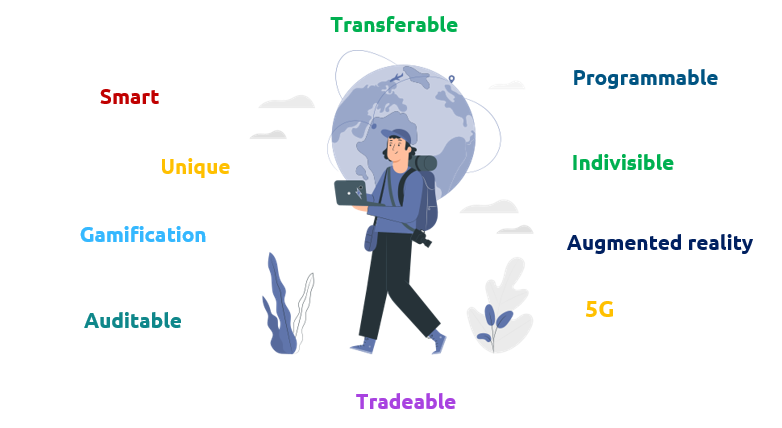NFT’s are memorable experiences for people & philosophy. They’re also an outstanding way of engaging & connecting with your audiences. Enterprises should consider using enterprise non-fungible tokens for their products and services and in general identify with NFT’s as a mechanism of interaction with customer and employees. While digital collectibles and the gaming industry have become two of the most well-known use cases of NFTs, there are several other industries where the use of non-fungible tokens is on the rise.
What are NFT’s?
An NFT (or non-fungible token) is a blockchain based digital certificate that provides ownership of an asset. It is trustworthy and easily transferrable. NFTs are impossible to forge and contain distinguishable information about owners and sellers.
“NFT’s are Digital Birth Certificates”
NFTs are growing more popular than ever. More brands are joining the bandwagon to experiment with its features and launch digital collectibles to earn more income and establish a deeper relationship with their target audience.
· As digital identity
· Immersive unforgettable customer experience
· As a way for connecting people
Tie NFT to connect with your employees and customers
Connecting your NFT collection to your brand & people is essential.
· Learning opportunity for talent
· Loyalty & Rewards
· Employee experience Memoria
· Experiment, but with authenticity and an eye on the future
NFT & INSURANCE: Coverage Inurement or Scam : There are a number of challenges within the insurance market when considering the provision of cover for NFT’s. The NFT market still remains in its infancy and as such brings with it a lot of volatility.
Insurers will continue to try to weigh the risks and offer NFT insurances in the future to meet the demand in the sector.The potential exposures of NFTs and legal environment are likely to continue to evolve over time as the technologies change.
Banking use cases could potentially include NFT-backed loans, , investments, and debt management. Fintech’s and banks can benefit from trading NFTs in the same way that anyone can benefit from selling collectible asset.
Using NFTs as loyalty tokens offers several potential benefits. Here’s how NFTs can be used in loyalty programs:
· Unique Rewards: NFTs can be created as unique digital assets representing loyalty points or rewards. Each NFT can have specific attributes, such as rarity, utility, or additional benefits tied to the loyalty program.
· Enhanced Engagement: NFTs can create a sense of exclusivity and value for customers. By offering unique and limited-edition NFT rewards, loyalty programs can incentivize customers to actively engage, participate, and continue their patronage.
· Tradable Assets: NFTs are easily transferable on blockchain platforms, allowing customers to trade or sell their loyalty tokens if they desire. This provides an additional avenue for customers to benefit from their loyalty and potentially attract new participants to the loyalty program.
· Gamification and Unlockable Content: NFTs can incorporate gamification elements by offering tiers, levels, or unlockable content tied to loyalty milestones. This can enhance the overall user experience and encourage customers to reach higher levels of engagement within the loyalty program.
· Proof of Ownership and Authenticity: NFTs inherently provide proof of ownership and authenticity. By leveraging blockchain technology, loyalty programs can ensure transparency, traceability, and prevent fraud or counterfeit rewards.
· Partnerships and Cross-Program Integration: NFT-based loyalty programs can foster collaborations between different brands or services. NFT rewards from one loyalty program could be accepted or utilized in another, creating cross-program integration and expanding the benefits for customers.
Other Industry Use Cases:
· Real Estate
· Consumer Goods
· Financial Assets
· Music and Royalties
· Personalized ticketing: NFTs can serve as more personalized tickets for live events such as music festivals, art shows, sporting events.
· Creating virtual worlds
· Limited edition content
· Patent disclosures
Conclusion
NFT marketplaces have traditionally only been used for buying and selling NFTs as collectibles. However, envisioning NFTs from collectibles to technology for digital identity & experiences will help expand the boundaries. Mainstream brands are beginning to understand the value of NFT technology and that it’s not a passing craze. The real-world applications of NFTs demonstrate their versatility and potential to revolutionize industries making a meaningful impact on society. As the digital economy evolves, these assets are expected to become an essential part of it in the coming years.
NFTs are still in their early days, and the possibilities for what they can do beyond art and collectibles are endless. We’re on the cusp of a whole new era of digital ownership and creator economy, and it will be exciting to see where it goes from here. It’s a way to create and generate value. It’s the same story as with every innovation. Once you find concrete use cases, both for enterprise and consumer applications, that’s where the value is unlocked, and that’s what we entrepreneurs need to focus strictly on. It’s not about speculation; it’s about generating solutions and leveraging technology.
We are only scratching the surface. It is an exciting time to be a part of this industry, and I look forward to seeing what the future holds.
- SEO Powered Content & PR Distribution. Get Amplified Today.
- PlatoData.Network Vertical Generative Ai. Empower Yourself. Access Here.
- PlatoAiStream. Web3 Intelligence. Knowledge Amplified. Access Here.
- PlatoESG. Automotive / EVs, Carbon, CleanTech, Energy, Environment, Solar, Waste Management. Access Here.
- BlockOffsets. Modernizing Environmental Offset Ownership. Access Here.
- Source: https://www.finextra.com/blogposting/24497/connecting-nft-to-your-enterprise-strategy-?utm_medium=rssfinextra&utm_source=finextrablogs
- :is
- :not
- :where
- 7
- a
- About
- accepted
- actively
- Additional
- Allowing
- also
- an
- and
- Another
- anyone
- applications
- ARE
- Art
- AS
- asset
- Assets
- attract
- attributes
- audience
- audiences
- authenticity
- Avenue
- Banks
- based
- BE
- become
- been
- Beginning
- benefit
- benefits
- between
- Beyond
- blockchain
- blockchain technology
- both
- boundaries
- brand
- brands
- Brings
- but
- Buying
- by
- CAN
- cases
- certificate
- challenges
- change
- collaborations
- Collectible
- collectibles
- collection
- coming
- Connect
- Connecting
- Consider
- considering
- consumer
- contain
- content
- continue
- could
- Counterfeit
- cover
- coverage
- create
- created
- Creating
- creator
- Creator Economy
- Cusp
- customer
- Customers
- Days
- Debt
- deeper
- Demand
- demonstrate
- desire
- different
- digital
- Digital Assets
- digital certificate
- digital collectibles
- Digital economy
- digital identity
- digital ownership
- do
- each
- Early
- earn
- easily
- economy
- edition
- elements
- Employee
- employees
- encourage
- Endless
- engage
- engagement
- engaging
- enhance
- enhanced
- ensure
- Enterprise
- enterprises
- entrepreneurs
- Environment
- Era
- essential
- establish
- events
- EVER
- Every
- evolve
- evolves
- exciting
- exclusivity
- Expand
- expanding
- expected
- experience
- Experiences
- experiment
- eye
- Features
- festivals
- financial
- Find
- Focus
- For
- forge
- Forward
- Foster
- fraud
- from
- future
- gamification
- gaming
- Gaming industry
- General
- generate
- generating
- Goes
- good
- Growing
- Have
- help
- here
- higher
- holds
- How
- However
- HTTPS
- i
- identify
- Identity
- if
- immersive
- Impact
- impossible
- in
- incentivize
- include
- Income
- incorporate
- industries
- industry
- information
- inherently
- Innovation
- insurance
- integration
- interaction
- Investments
- IT
- ITS
- joining
- launch
- learning
- Legal
- levels
- leveraging
- likely
- Limited
- limited-edition
- live
- Live Events
- Loans
- Look
- Lot
- Loyalty
- loyalty program
- Loyalty programs
- Mainstream
- Making
- management
- Market
- marketplaces
- meaningful
- mechanism
- Meet
- memorable
- Milestones
- more
- most
- Music
- Need
- New
- NFT
- NFT collection
- nft market
- NFT technology
- NFTs
- non-fungible
- non-fungible token
- non-fungible tokens
- number
- of
- offer
- offering
- Offers
- on
- once
- ONE
- only
- Opportunity
- or
- Other
- outstanding
- over
- overall
- owners
- ownership
- part
- participants
- participate
- partnerships
- Passing
- patent
- People
- Personalized
- philosophy
- Platforms
- plato
- Plato Data Intelligence
- PlatoData
- points
- Popular
- possibilities
- potential
- potentially
- prevent
- Products
- Program
- Programs
- proof
- provide
- provides
- provision
- rarity
- reach
- real
- real world
- relationship
- remains
- representing
- revolutionize
- Rewards
- Rise
- risks
- s
- same
- Scam
- sector
- see
- seeing
- sell
- Sellers
- Selling
- sense
- serve
- Services
- several
- should
- Shows
- Society
- Solutions
- specific
- speculation
- Still
- Story
- Strategy
- such
- Surface
- Target
- Technologies
- Technology
- than
- that
- The
- The Future
- their
- There.
- These
- they
- this
- ticketing
- tickets
- Tied
- time
- to
- token
- Tokens
- Traceability
- trade
- Trading
- traditionally
- Transparency
- trustworthy
- try
- two
- understand
- unforgettable
- unique
- use
- used
- User
- User Experience
- using
- utility
- utilized
- value
- Virtual
- Volatility
- Way..
- we
- weigh
- well-known
- What
- when
- while
- whole
- will
- with
- within
- years
- You
- Your
- zephyrnet














